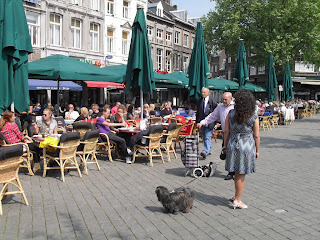It's now been almost two weeks since my last post, but they have been very full. As I wrote about then, I spent my Easter holidays back in the low countries with friends from the year I spent on exchange there (2008-09). The ambitious part of the journey was getting there, as I planned to do it without flying. As it turns out, I'm a pretty good at being my own travel agent. Everything went off without a hitch.
The bus ride to Hendaye (just over the border in France) went smoothly - it was full of people heading to the beach in San Sebastian, including one of my first-grade students and his family. Part of me was grumbling about not being able to leave work behind, but it also made me feel much more like I actually
live here, rather than just being a visitor. The majority of the passengers got off in San Sebastian, and from there it was a guessing game as to which of the remaining small stops was Hendaye. It was particularly fun considering I was reading signs in three languages - French, Spanish, and Basque. The train station in Hendaye is the terminus of the Euskotren system (the Basque region's commuter rail) and the terminus (in the other direction) of the French national rail system. At the Euskotren platform, the station is known as Hendaia, while at the SNCF platform, it's called Hendaye. It was an interesting glance into the oddities of regions with linguistic minorities.
I had high expectations for the TGV train that I took to Paris, and it met them. The staff were helpful and friendly (although their quick transitions into English reminded me how poor my French has become), I had two seats to myself the whole way, and we made a total of only 5 or 6 stops, most of them in the first hour. The rest of the trip was simply watching France fly by in comfort. Upon arrival in Paris, I realized I wasn't going to see any of the city if I took the metro to my hostel, so I walked from Gare Montparnasse to my hostel near Gare du Nord, which took about an hour and a half. It was a slight shock to be in such a big city again, but Paris is always fun to look at. Perhaps the most memorable part of my walk was near the Île-de-la-Cité, when a young man decided to throw himself on the ground in front of me in a push-up position and crabwalk to prevent me from passing. Not able to yell at him in French, I let another pedestrian's right foot do the work of clearing the way, and then checked to make sure I hadn't been robbed.
After a fairly uneventful stay at the hostel, I woke up at 6 and walked to Gare du Nord, where I ordered a muffin and thanked the woman in Spanish (a habit that took me a few days to kick). My Thalys train left just after 7, making one stop in Brussels before dropping me at Liège 5 minutes after the hourly train to Maastricht. I wasted time by reading
Metro, the free newspaper available in train stations, and made it to Maastricht a little before 11. The whole journey took a little over 24 hours (with a sleep in a bed included), and was generally comfortable.
The rest of my week was like updating an old photo album. I went to Guillaume's house in Louvain-la-Neuve (near Brussels) with Chris, where we played croquet, enjoyed his mom's always amazing cooking (including waffles, which somehow are always on the menu when I'm around), and enjoyed sunny 25°C weather, for which I had to borrow shorts and flip-flops. Once we got back to Maastricht, I whiled away a pleasant 3 days hanging out with old friends and meeting new ones, playing soccer by the medieval city walls, and brushing up on my Dutch. I actually feel like I've improved simply by virtue of being more accustomed to speaking a second language. On Friday, I left Maastricht with Rene, Guillaume and Chris to go to Nijmegen, where Rene's sister lives, to enjoy the Queen's Night celebration. The following morning, we headed to Amsterdam to celebrate Queen's Day (the annual celebration of the Queen's birthday, a public holiday and tax holiday). I spent only a few hours there before heading to the airport for my flight back to Madrid, from whence I caught the bus to Logroño and arrived back, exhausted, at 5 AM.
Altogether, it was an enjoyable trip that reminded me of the little things I forgot about my year in Holland, like the impossible-to-navigate train ticketing system and the fun-sounding language. But mostly, it was nice to see my friends again and enjoy their company with no other responsibilities. I was also happy to find out that Spain got drenched with rain while I was gone, while Holland and Belgium were both almost perfectly sunny and warm.
 |
| Near Guillaume's house in Louvain-la-Neuve. |
 |
| On the east side of the Maas. |
 |
| Market Square in Maastricht. |
 |
| Queen's Day in Amsterdam. |
|
|
 |
| A little souvenir of the Dutch language - "I'm the boss." |
|







